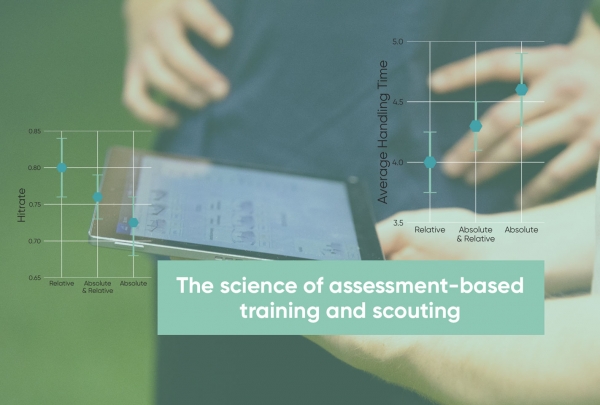
The skills.lab Arena is a complex combination of advanced technology and sophisticated algorithms, all dedicated to transparently assessing and individually improving the technical, cognitive and athletics skills of football players (we use “football” as shorthand for European football, alternatively known as “soccer” in the United States and some other countries).
A study by researchers Eyring, Ferguson, and Koppers(1) from The London School of Economics, Harvard Business School and WHU determined better approaches for providing performance feedback during a training session in the skills.lab Arena. These results influence our visual performance feedback, displayed for players inside the Arena.
Our indoor training system skills.lab Arena was chosen for this study, because of its technical features that deliver accurate performance measurements. Replicable training exercises that are either not measurable or not reliably measurable would not be suitable to determine a player’s performance improvement. With our precise measurements that are evaluated in real-time, these performance effects are shown. In the authors’ own words:
We randomly assign different performance information treatments at the player level, and precisely measure the performance of each player in our experiment by using skills.lab’s tracking technology. We exploit the combination of these features to provide precise, causal estimates of the performance effects of the different types of information.
Although the skills.lab Arena has a large set of available exercises to choose from, the researchers designed their own exercises to ensure no player had practiced this specific version of the training drill before. The specifications of the training drill, including the speed of the passes ejected from the ball machines and the target for passes, were custom-made in our training editor.
For a valid experiment, the conditions needed to be reproducible and identical for all players, which would be highly challenging on an outside football field. The skills.lab Arena was selected by the researchers, because it offered this reliability:
For our experiment, we take advantage of a number of technical features of the simulator. As the simulator is fully programmable and automated, we keep the elements of the passing task perfectly replicable among participants.
The researchers analyzed which types of information and information density are better suited to motivate players to improve over their own prior performance. The skills.lab Arena visualizes game-like scenarios onto large canvases that need to be solved by shooting or passing a ball at the canvas. One exercise in the skills.lab Arena consists of multiple repetitions of the same or similar scenarios. At the end of such an exercise, an additional visual performance information is displayed on one of the screens. This visual information was customized with one of several different displays to measure its effectiveness. Here is one main conclusion of the research:
Strong incentives motivate players to outperform their teammates while training in the skills.lab simulator. The players in our study are interested in securing a spot in the best league and a starting spot in their current team. Managers reported using players’ rank in the simulator when making these selection decisions. Managers also explained that players are aware of this practice and thus have strong incentives to perform well in the simulator.
The study shows that players respond differently depending on their individual level of experience. Inexperienced players early in their sports career performed better with a broader set of information whereas more experienced career players seemed to respond best to a more competitive performance display. Here is what the researchers said:
We find evidence that there are greater benefits of relative performance information in the presence of greater task commitment and stronger career concerns. For substantially less-experienced players, who are engaged in learning and skill-development, we show that providing the broader information set—both absolute and relative measures—benefits performance.
The skills.lab Arena enables highly competitive challenges (with a focus on relative performance compared to peers) as well as individual training sessions, thereby engaging and motivating participants in different ways during their player lifecycle. The researchers have demonstrated the potential for customization in order to achieve the strongest performance effects.
In the upcoming weeks and months, our series of blog posts about research related to our skills.lab training systems will continuously grow. Contact us if you have any questions or want to learn more about the skills.lab training systems.
—
(1) Henry Eyring*, Patrick J. Ferguson†, and Sebastian Koppers‡,
Less Information, More Comparison, and Better Performance: Evidence from a Field Experiment.
Journal of Accounting Research. 2021, 59(2): 657-711.
https://onlinelibrary.wiley.com/doi/full/10.1111/1475-679X.12362
Author affiliations:
* The London School of Economics and Political Science
† Harvard Business School, Harvard University and Laboratory for Innovation Science at Harvard
‡ WHU Otto Beisheim School of Management